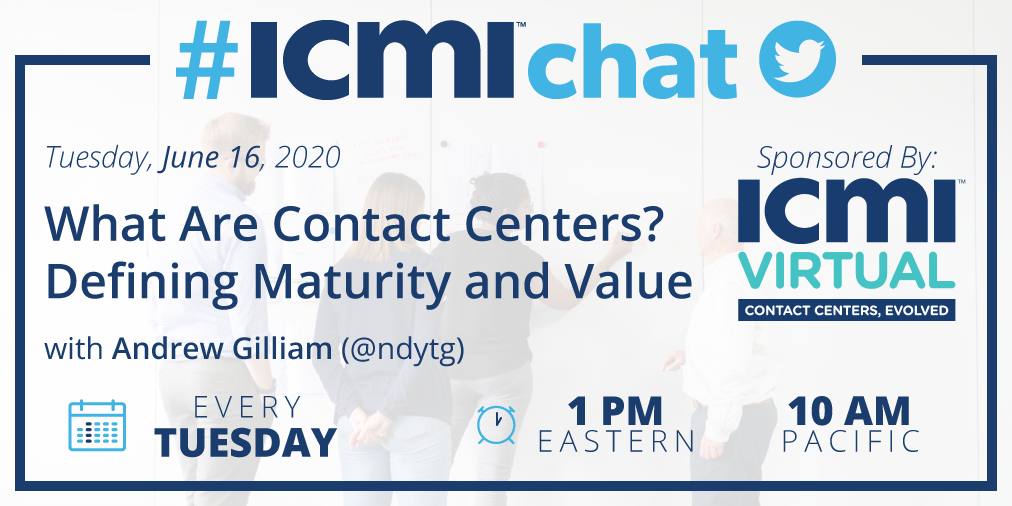By
The Editors
|
Date Published: June 10, 2020 - Last Updated September 08, 2020
|
Comments

Brands of all shapes and sizes were quick to create virtual events, as health concerns forced people around the world to work from home and stay socially distant from their professional communities. While the quantity of events skyrocketed, the quality of these gatherings is debatable. Professionals are also feeling the increased demands on their time, both as content creators and consumers. Ignoring these offerings altogether is a missed opportunity, but there's no way to be everywhere at once.

ICMI Virtual sponsors this week's rundown. With sessions covering agent experience, culture, metrics, cloud technology, and more, you won't want to miss this free, one-day event! Register for free to watch live on June 17 or receive a recording for on-demand viewing.
This week, #ICMIchat weighed in on what makes virtual events great, and where they could be improved. They shared strategies for making the most of these events for your direct reports and how teams can work collaboratively to maximize learning efficiency. The fad will eventually calm down, but virtual events are here to stay. Use these tips to make the most of online learning opportunities for your contact center.
Join us on Tuesdays at 1 p.m. Eastern, 10 a.m. Pacific to weigh in on the contact center industry's most pressing challenges. Next week, we explore "What Are Contact Centers? Defining Maturity and Value." A question preview follows this article.
Too Much Of A Good Thing
It's incredible how many virtual events have popped up overnight, offering contact center and customer experience practitioners more access to knowledge than ever. While more knowledge is good, some events were created merely to garner attention rather than deliver value for the audience. Many practitioners find themselves overwhelmed, and they are taking more time to squeeze in learning wherever they can. Learning is good, but work-life balance is also vital. Be careful not to burn yourself out.
I've been attending many more webinars + virtual events. I picked up early on that many were just pushing out content without regard for quality. That was a fast sore spot. But if I see something that really speaks to me, I'll check it out. But it has to be good.
I’ve been reading a lot more. I’ve watched videos but not really attended online events live. I prefer to consume good content at my own pace, rather than per someone else’s schedule.
I have accepted more invites than usual. My org is experiencing unprecedented growth. My days are full. I watch the recordings instead of Netflix.
Respect Audiences' Time
We asked the community which format of events they prefer. While no specific arrangement stood out, a key underlying theme is that professionals like to consume knowledge efficiently. Our time is valuable, so use the time you're allowed well. Offering activities to self-study or self-assess before of after virtual events helps learners make the most of their time.
Short, engaging, and useful.
Ex: I like the online ukulele lessons because I'm working on my skills the entire time, and the continue to practice on my own afterwards.
Side note: all this practice has revealed a severe lack of talent.
I prefer 1 hr events since they fit more easily into my schedule. Also frankly, I can't sit still for anything longer than 1 hr! (That could be because I am pretty hyper!)
As an instructor, my favorite virtual event format is a recurring series of live webinars with readings, homework, and in-webinar breakout discussions. Instructors need to create the maximum number of opportunities for learners to DO stuff and get feedback on it.
Dissenting Opinions Welcome
Do you have a best friend who agrees with you on practically everything? It's great when someone has your back, but they're also unlikely to challenge your thinking in a way that helps you grow. Healthy disagreement creates learning opportunities. Likewise, a panel discussion or debate where everyone sings the same chorus is boring and not an efficient use of time. As an audience member, don't be afraid to ask the tough questions.
I think it totally depends on the subject matter and whether or not you're saying the same thing everyone else is saying. For example, we're probably good on the work from home topic for a bit.
I love great content. For me, panels and roundtables are really great ways to get a lot of perspectives about a topic. When the topic is fresh and the speakers are experienced, that's a great combination.
Not Virtually Identical
The hard truth is that virtual events are not in-person events, and they'll never be quite the same. Virtual events often have a lower production value, are not as well-capitalized, and consumers and sponsors aren't willing to pay for the same frills. That doesn't mean that virtual events are better or worse than on-site; they're different. Each format has unique strengths and weaknesses. Finding activities that build on the unique strengths of the virtual format will deliver the most bang for your buck.
I'll tell you one thing I miss is networking with other attendees. Small, sometimes informal, breakout conversations. Our peers have a lot to offer to us and virtual events can be more challenging (not impossible?) to provide these opportunities.
I have no patience for virtual ones. If I am in person I feel bad about leaving early, but online, if I can't identify my benefit within the first 2 minutes, I probably won't stay. Sorry...
My expectations are lower for online events because there is less commitment on my part (i.e. no driving, finding parking, getting to my seat.) Plus, Stephanie Thum mentioned, I can always quietly drop off of anonline event less noticably than an in-person one
Helping Employees Go Virtual
One of the most exciting opportunities presented by more virtual offerings is that they are more widely accessible to more types of people. Sending a front-line agent or supervisor to a physical conference was always a tough sell, but now they have affordable access to the same content and experiences as their senior peers. As a leader, help your team to take advantage of these opportunities to grow your employees and organization.
Exactly the same way you'd maximize the value of any content.
1. Identify the goal
2. Determine the gap
3. Close the gap
Help them find meaningful content that speaks to a challenge currently faced by the team. Ask the attendees to bring a couple ideas back to their peers. Challenge them to take create an action plan immediately following, where possible
Start by setting an expectation that they attend and be fully engaged so they don't feel guilty about blocking it out on their calendar. Heck, they should be able to shut down messaging just like they would at a conference.
Leaders can maximize value of online events by not treating virtual events as one-time happenings. For an Aug 1 webinar, leaders can hold a July 25 discussion to help staff pose questions & an Aug 3 meeting where people to report on their takeaways.
Do More Together
Whether in-person or online, learning with a friend or colleague can be more effective than going it alone. Everyone processes information differently; by working together, you can be sure not to miss a thing. Additionally, the conversations sparked by shared knowledge stimulate more concrete ideas for applying what you've learned. Not to mention, everyone is short on time these days. Splitting the learning with a colleague can make better use of your individual time. Consider organizing a way to divide up virtual events with your team and then share your knowledge as a group later.
Collaboration by sharing information! Sometimes it’s best to divide and conquer. If your in the same event, share your takeaways - each person may find something that stands out more to them. Information sharing is key to success!
While people naturally pick up different points during a webinar, sometimes assigning each person a key skill or perspective to follow will help them focus on the content. For example, 1 person looks for CX ideas, while another looks at digital transformation.
I know my team is planning to attend an event and we're going to divide and conquer the sessions and then come together later to swap insights.
Building A Virtual Network
Expanding your professional network and developing a support system of industry peers is one of the best parts of in-person events. Achieving the same level of connection virtually isn't always easy, and requires more deliberate action from the audience. It's worth it, though! Many speakers provide their contact and social media information on an introduction slide. Always take a moment to connect with them; speakers love hearing from attendees. If you haven't already, follow and connect with our #ICMIchat community. That's what we're here for!
Absolutely! Share contact information and collaborate afterwards! Connecting allows you to share ideas and bounce ideas off others where your encountering a challenge. Odds are someone else has encountered the same problem.
This is definitely tricky. I noticed a couple of events doing LinkedIn groups. That helped me add people on LinkedIn and go from there. But the groups dry out pretty soon!
I have loved gradually initiating video meetings with people I connect with on social. It's such a great way to connect and build relationships with folks.
Making Virtual Better
Many organizations were thrust into virtual events without much prior experience. Everyone is learning how to adapt to the needs of modern audiences and create content that excites and inspires. In closing, #ICMIchat offers these tips to brands who are early in the learning process.
Make it relevant. Start by understanding a problem your audience is trying to solve right now. Then help them solve it.
Creators of webinars and virtual events should keep in mind that quality matters. Don't push out content just to meet a quota. Consider working with influencers to bring some context, trust, and spark.
Find ways to get us up and moving around. And perhaps assign us with a buddy or small group to connect with throughout the event.
Always focus on providing value for your attendees. What will they differently as a result of the event? What takeaways (ideas) will they receive? Also, did they get to interact with other attendees and build any new relationships?
Virtual event organizers, please remember how important it is to have an emcee for a virtual event. You need someone to keep the experience unified for participants.
Is this an event...or can you just send me a recording...Everyone's schedules are still not normalized and often people need flexibility.
#ICMIchat June 16, 2020
What Are Contact Centers?
Defining Maturity and Value

Next week's #ICMIchat is sponsored by ICMI Virtual, the free, one-day summit for contact center professionals. Featuring speakers from the #ICMIchat community, this event delves into the industry's most pressing challenges. Register now to attend live on June 17 or watch on-demand later.

Q1: What is a contact center? Does it differ from some people in a room answering phones and emails?
Q2: What specific processes or activities make contact centers what they are today? How do these systems contribute to their success?
Q3: How can you tell an effective, mature contact center from a lousy, haphazard one? What’s the top priority?
Q4: Is it possible for contact centers to create economic value that outweighs their costs? What’s the first step to pivot from cost center to value driver?
Q5: Where do contact centers fit into customers’ journey, and what role do they play in customer experience management?
Q6: How do other business units and executives perceive contact centers? Should we be doing anything to manage their perceptions?
Q7: Are contact centers particularly good or bad places to work? Why?
Q8: How will contact centers continue delivering value in the future, as conversational bots and artificial intelligence continue reducing demand for routine requests?